CNN
—
Palestinian officials say a massive bombing at a Gaza hospital killed hundreds on Tuesday, raising humanitarian concerns over Israel’s lack of supplies to people, including food, fuel and electricity.
Al-Ahli Baptist Hospital was sheltering thousands of displaced people when it was bombed on Tuesday, the Palestinian Ministry of Health said in a statement. It said many victims were still under the rubble.
Palestinian officials have blamed Israeli airstrikes for the deaths. But Israel’s security forces have “absolutely” denied any involvement in the hospital attack, instead blaming a “failed rocket launch” by the Palestinian Islamic Jihad group, a rival Islamist militant group in Gaza.
“We didn’t hit it, the intelligence we have says it was a failed rocket launch by Islamic Jihad, and I want to add categorically that we didn’t intentionally hit any critical facilities, any critical facilities. Certainly not hospitals,” Lt. Col. Jonathan Conricus told CNN.
Israel has blockaded Gaza More than a weekIt was in response to a deadly incursion by Hamas, the Islamist militant group that controls the coastal region of 2.2 million people. Meanwhile, hospitals are running short of electricity and water and are struggling to treat the wounded across the territory.
Meanwhile, despite diplomatic efforts to open a corridor from Egypt, vital humanitarian aid has been concentrated at Gaza’s closed border. The United Nations and other officials have said any potential aid convoys need guarantees of safe passage.
As international pressure mounts to address the crisis, US President Joe Biden An unusual wartime visit to Israel followed Wednesday’s intensive efforts by Secretary of State Anthony Blinken across the Middle East.
Palestinian Authority President Mahmoud Abbas canceled a planned meeting with US President Joe Biden after the hospital attack and instead said he would return to Ramallah for an emergency meeting of the Palestinian leadership.

Al-Ahli Baptist Hospital in the center of Gaza City is sheltering thousands of displaced people forced from their homes by the occupation, according to the Palestinian Ministry of Health in Gaza.
Hamas, which controls the area, said more than 500 people were killed in the bombing. The Palestinian Ministry of Health said earlier that preliminary estimates suggested that between 200 and 300 people had died in the attack.
Israeli Prime Minister Benjamin Netanyahu blamed “brutal terrorists in Gaza” for Tuesday’s attack on the hospital.
“He who brutally murdered our children is also murdering their children,” he added.
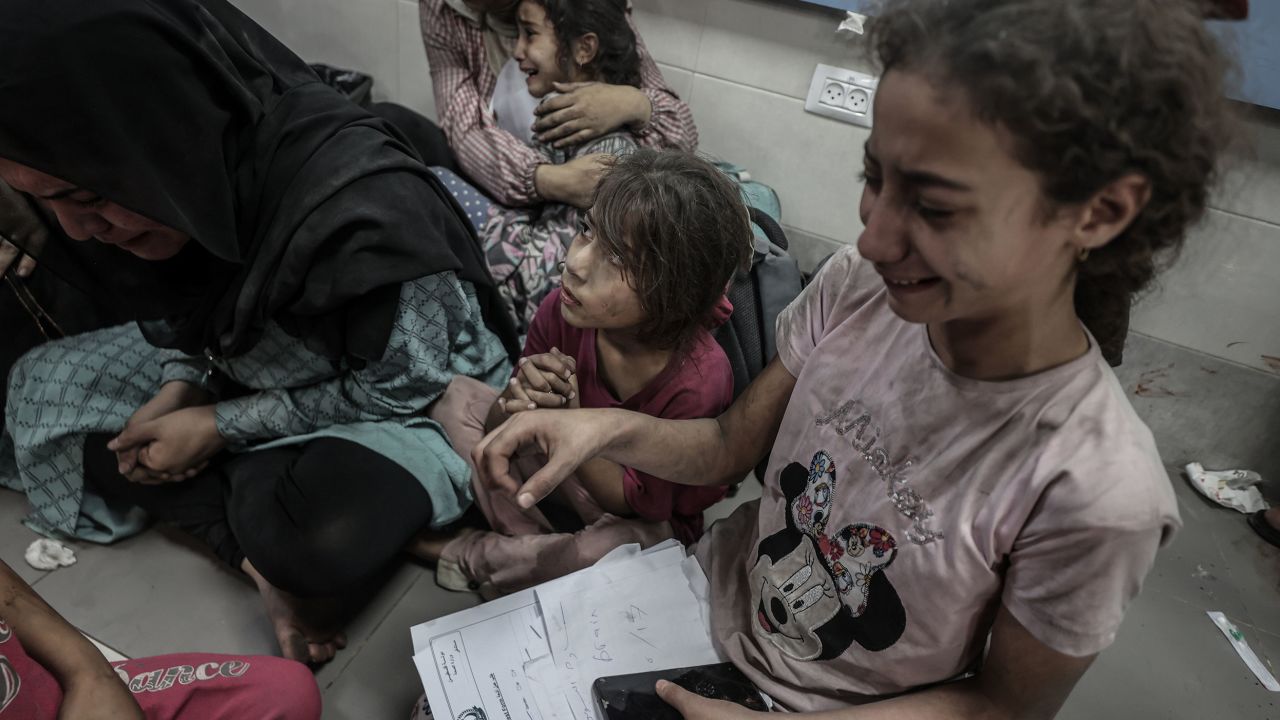
More than a week of Israeli bombardment in Gaza has killed at least 3,000 people, including 1,032 girls and 940 boys, and injured 12,500, the Palestinian Health Ministry said on Tuesday. The death toll in Gaza in the past 10 days has surpassed the number killed during the 51-day Gaza-Israel conflict in 2014.
While the IDF has said it did not target hospitals, the UN and Doctors Without Borders say Israeli airstrikes have hit medical facilities, including hospitals and ambulances.
On Tuesday, Israeli warplanes struck two densely populated refugee camps and an UNRWA school housing displaced people in central Gaza, killing at least 18 people and wounding scores, Palestinian officials said.
Top Hamas commander Ayman Nofal was killed in an airstrike in Gaza on Tuesday, the IDF said.
At least 61 people were killed in the occupied West Bank, the Palestinian Ministry of Health said on Tuesday. At least 20 humanitarian workers from the UN, Red Cross and Red Crescent Societies have been killed in Gaza.
Meanwhile, health services inside Gaza are on edge and food and water supplies are limited. The UN Relief and Works Agency (UNRWA) warned on Tuesday that 20 out of 23 hospitals were providing partial services as fuel reserves were “almost completely exhausted”.
UN Agencies have warned that stores are less than a week away from running out of food stocks and that Gaza’s last seawater desalination plant has closed, threatening further casualties, dehydration and water-borne diseases.
Hospitals are receiving dozens of bodies from various parts of southern Gaza, said Dr. Mohammad Jagout told CNN. This number includes dozens of victims of airstrikes in Rafah.
At least 49 people were killed in Israeli airstrikes on the southern Gaza cities of Rafah and Khan Younis, the Palestinian Interior Ministry said.
IDF spokesman Lt.-Col. Jonathan Conricus told CNN, “It doesn’t look like there were any strikes specifically in those areas, but they could have.”
In Pictures: Deadly Clashes in Israel and Gaza
As aid continues to pour into the Egyptian side of the border, urgent calls for help are mounting on both sides of the border.
Blinken said on Tuesday that the United States and Israel “agreed to develop a plan to enable humanitarian assistance from donor countries and multilateral organizations to reach civilians in Gaza.”
But on the Egyptian side of the Rafah crossing, Egyptian Foreign Minister Sameh Shoukry told CNN that a miles-long convoy of humanitarian aid was waiting to enter Gaza.
“Until now, no safe passage has been provided because those convoys have no authorization or clear, safe routes and they can enter safely without any possibility of being targeted,” he said.
He added that the crossing had been bombed four times in the past few days.
Across the border, moving aid to those in need is more complicated in Gaza, where Israeli airstrikes have repeatedly hit the UN in the past week.
“We need to have areas where humanitarians can go safely, where people receiving humanitarian assistance can receive that assistance safely,” UN spokesman Dujarric told a CNN press conference on Tuesday.
“The last thing you want to see is creating distribution points where people are getting help that aren’t safe.”
WHO spokeswoman Margaret Harris told CNN that the UN health agency has reached an agreement with Egypt’s President Abdel Fattah el-Sisi to open the Rafah crossing for aid — but Israeli strikes have made the facility unsafe, halting the movement of critical goods.
On Tuesday, Israel’s National Defense Minister Itamar Ben-Gvir said that until Hamas released the hostages, only hundreds of tons of explosives from the air force should enter Gaza, not humanitarian aid, he wrote in a Telegram.
On the Gaza side, scores of evacuees gathered through the crossing Mass displacement According to UNRWA, at least 1 million people have fled their homes in the past week alone.
A family of five Palestinian-Americans, all US citizens, traveled to Rafah on Monday after hearing the borders would be opened but to no avail, Haifa Gout said, adding that her husband Hesham was among the five trapped in Gaza.
Satellite images provided by Maxar Technologies show four 30-foot (9-meter) ditches with concrete slabs blocking the road at the border crossing closest to the Egyptian entrance.
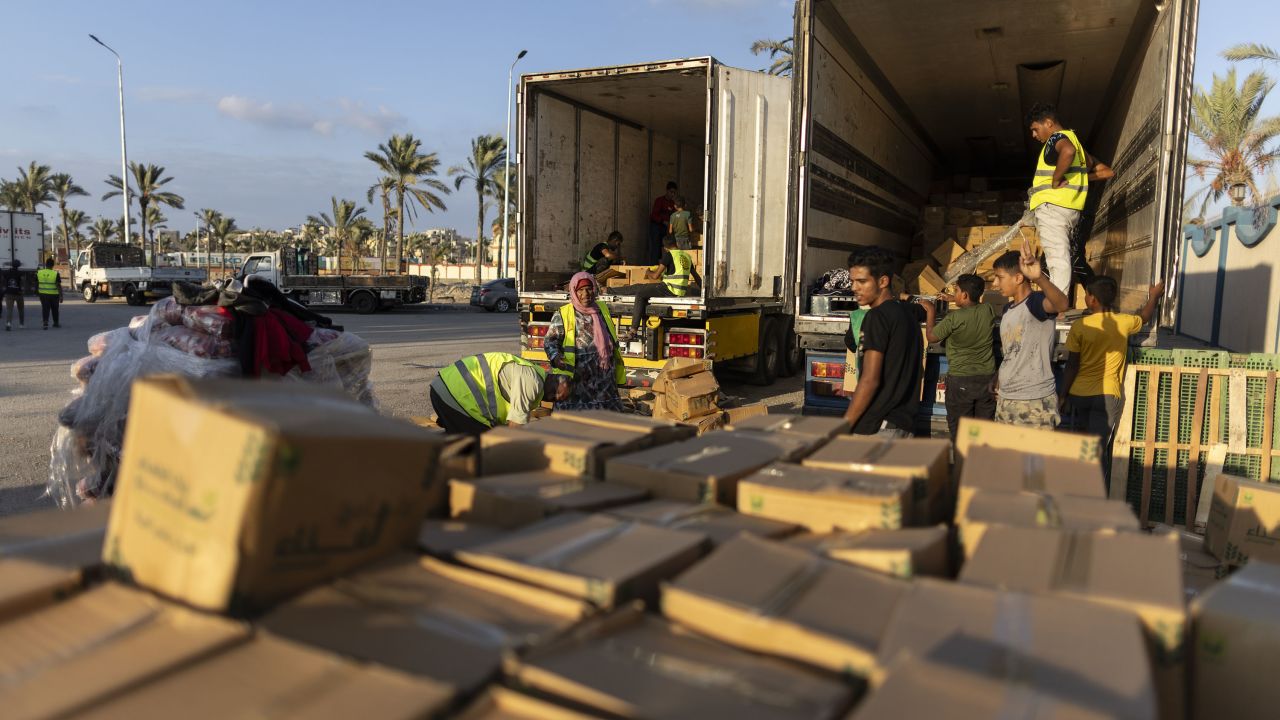
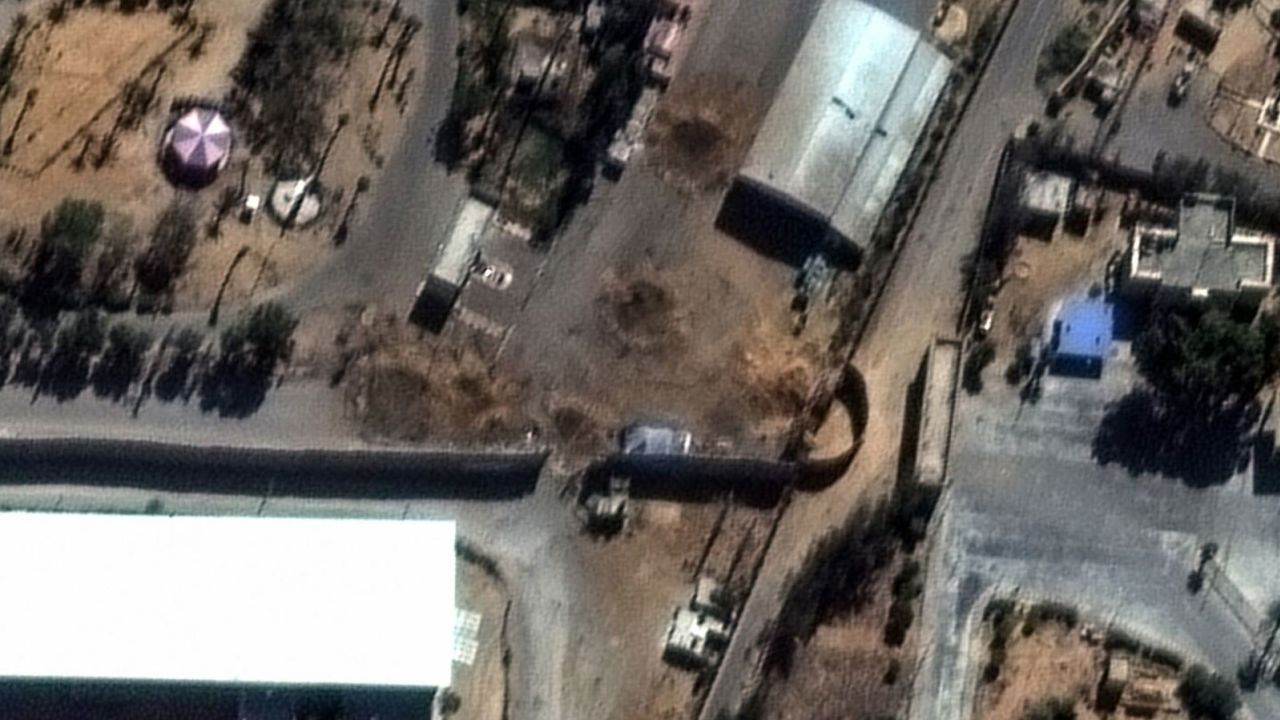
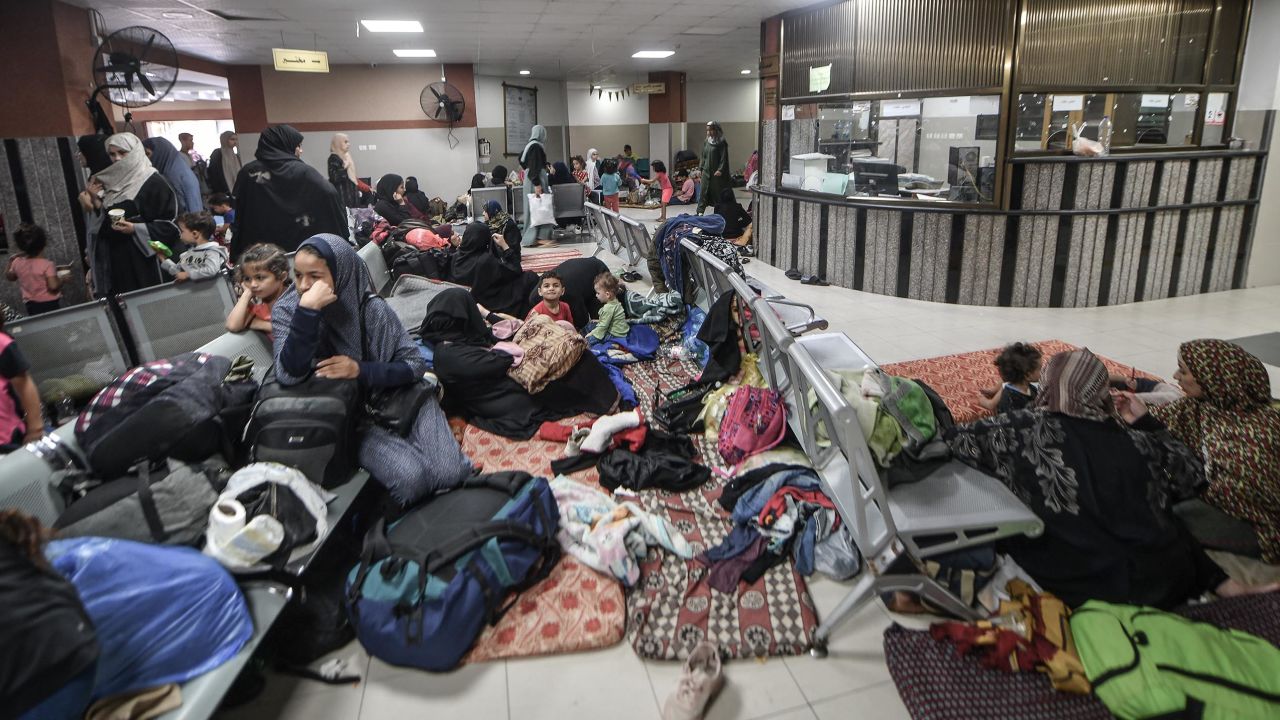
Diplomatic efforts to defuse the conflict have so far failed. On Monday, the UN Security Council rejected a Russian resolution calling for a humanitarian ceasefire after failing to get enough votes.
Several countries, including the United States, the United Kingdom and France, voted against it because the draft did not condemn Hamas for the October 7 attack, which the Israel Defense Forces (IDF) said killed at least 1,400 people.
This includes Mia Schem, the French-Israeli woman featured in the first hostage video released by Hamas. Speaking to reporters on Tuesday, his mother Keren Scharf pleaded with world leaders to “bring my baby home”.
CNN could not independently verify where and when the video of the 21-year-old Schem was taken or his current condition.
Regional leaders have raised concerns about fighting between Israel and Lebanon’s powerful Iran-backed Hezbollah in the north and Syria, with attacks on the border becoming a flashpoint for the wider conflict.
The IDF reported that gunfire was directed at several locations along the security fence between Israel and Lebanon on Tuesday.
At the same time, Iran’s Supreme Leader Ali Khamenei warned that if “atrocities” against Gaza continue, “Muslims and resistance forces will lose patience” and that no one will be able to stop their actions.
After Hamas’ incursion on October 7, the militants opened fire from Lebanon, which Israel intercepted and returned fire.
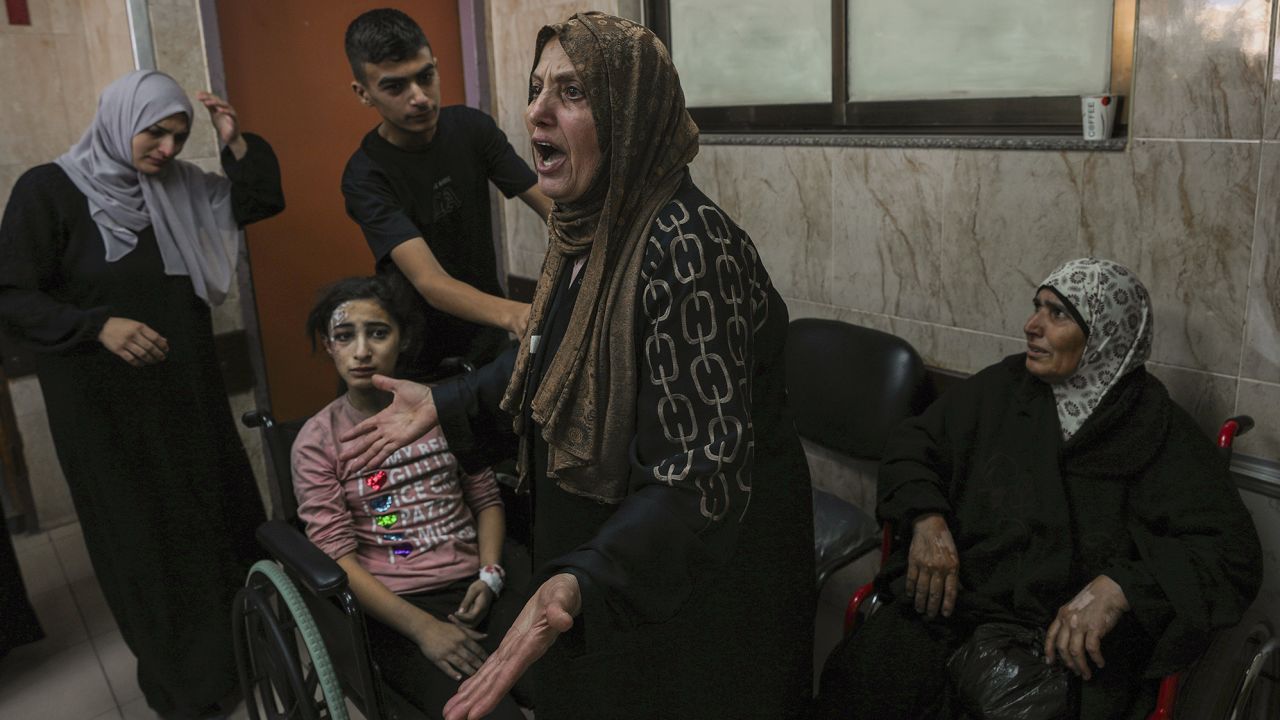
Issam Abdallah, a Reuters reporter from southern Lebanon, was killed in an Israeli strike on Friday evening local time. At least six journalists were injured in the attack.
A CNN video analysis found that journalists were wearing vest jackets clearly marked Press.
On Tuesday, at least four people were killed in Israeli strikes in Alma al-Shab in southern Lebanon, the Lebanese Red Cross said.
Two Hezbollah fighters were killed in Tuesday’s clashes, the militant group said. It is not clear if they are part of the death toll reported by the Red Cross.